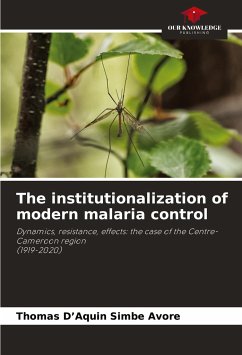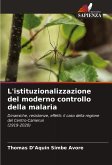This book seeks to capture the dynamics of the institutionalization of modern malaria control in the Centre-Cameroon region. In other words, it aims to give an account of the process by which modern malaria control was progressively and gradually established from the arrival of the French colonizer in 1919. To achieve this objective, the book uses a methodological approach based on neo-institutionalism in its three variants: historical, sociological and rational choice. It also draws on data collection and processing techniques. The result is that the modern fight against malaria in the Centre-Cameroon region is being institutionalized through sequences of actions which, however, are subject to numerous tribulations that make their effects on the social field ambivalent. In the end, it shows that, despite these multiple tribulations, modern malaria control can be improved in the geographical area of the Centre.
Bitte wählen Sie Ihr Anliegen aus.
Rechnungen
Retourenschein anfordern
Bestellstatus
Storno








